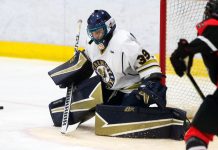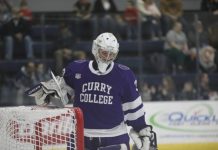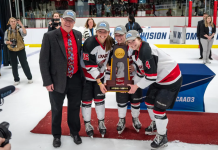Four years ago, shortly after Boston University won the 2009 national championship, I interviewed associate head coach David Quinn about the team’s historic comeback from a 3-1 deficit.
If you watch the video of that game, you’ll see BU give up the goal that made it 3-1 with just over four minutes left. And then you’ll see Quinn immediately approach head coach Jack Parker and exchange a few words. Quinn was lobbying to pull the goalie immediately, but Parker was initially unconvinced.
Quinn was right, of course. Parker ultimately changed his mind, and the rest is history. Still, it was Parker’s choice to mind. “Assistant coaches make suggestions,” Quinn told me. “Head coaches make decisions.”
Starting next fall, we’ll get to see what decisions Quinn makes behind the Terriers bench. Last week, Quinn was named the head coach of his alma mater. He brings a healthy combination of charisma, presence and drive to go with a resume that includes a great history as a recruiter as well as a useful apprentice as an AHL head coach and NHL assistant coach over the last four years.
Taking over at 46, Quinn is not going to match Parker’s 40 years or 897 wins, but he will have the opportunity to help the team end a four-year hardware drought that coincidentally — or maybe Quinn-cedentally? — began when the Rhode Island native left the program to coach in the Colorado Avalanche’s system.
So how will things look different for Boston University’s team — beyond a more aggressive approach to pulling the goalie later in the game?
“I think that whenever there’s a coaching change, things are going to be different no matter what,” Quinn told me in a phone interview. “Every team takes on its coach’s personality, and BU hockey is going to be a reflection of my personality — just as it’s been a reflection of Jack’s personality for that last 40 years.
“That being said, there’s an awful lot of similarities to the way that Jack and I do things. As I mentioned last week at the press conference, when I went to back to work for Jack it struck me how much of my coaching philosophy is connected to Jack. There will be some differences, but I’m not going to come into BU and say, ‘Oh, Jack did it this way; I’m going to do it that way.’ That’s just not how it’s going to work. I’m going to do things the way that I’m comfortable doing that I think will work.”
Quinn is also inheriting a program that took its lumps last season due to off-ice issues leading to an in-house review of the team’s culture and many internal changes as a result.
“Last year was obviously an aberration with the two incidences that they had,” Quinn said. “Like I said in the press conference, this program is not broken.”
It will fall to Quinn to ensure that the team continues to do just as well off the ice as on it. I asked him about what he intends to do to make the culture as positive as possible.
“One of the things Jack taught me is that you need to hold people accountable in every aspect of their lives, on and off the ice,” Quinn said.
“That’s a philosophy that we need to carry through the program, whether it’s a hockey issue, social issue or academic issue. To me, you need to be demanding; you need to hold them accountable, but you also need to let players know that this is a ‘we’ thing. Everything we do is geared to making them better players and better people. The sooner they realize it, the better off the whole program is going to be.”
Quinn has definitely had the opportunity to make himself better as a coach through his professional tenure.
“Without question, when you’re able to coach 80 games a year for three years, that’s 240 hockey games,” he said. “That’s almost six or seven college seasons. You just learn an awful lot. You go through all of those experiences, making decisions — making decisions that don’t work and learning from it.
“Without question, I’m a much better coach than I was four years ago because that’s all I’ve done for four years. When you’re an associate coach or assistant coach at the college level, so many of your responsibilities are recruiting. You’re getting your coaching in around the recruiting.”
Quinn, a former first-round NHL draft pick whose promising professional career was derailed and limited by a blood clotting disorder, also will be able to give his players a firsthand sense of what it really takes to succeed at the professional level.
“I knew a lot about pro hockey, but obviously when you’re living it and you’re coaching in the American league and then in the National Hockey League, it just validates some of the things you’ve thought, and you find out some things that you didn’t know,” Quinn said.
“It certainly will help as we recruit high-level kids who aspire to play in the National Hockey League. They need to realize how difficult it is to be an NHLer. A lot of guys assume they’re going to make it because they’re drafted in a certain spot. They need to realize they have a three- or four-year window to make it because in that time you have more drafts and more prospects.
“It’s a very difficult thing to do, and you need to make sure that every day and in everything you do, you’re geared to being a pro and being the best player you can be — not only when you’re at the rink but when you’re away from the rink.”
Over the last four years, BU has had several seasons that could be described as pretty good, but not quite good enough.
Last year, the team qualified for the NCAA tournament but got trounced but Minnesota. Two years ago and this year as well, the team fell just short of making the NCAAs. Both cases were because of losses to teams with losing records and unfortunate stretches of poor play in the middle of the season after promising starts.
“Boy, it was really unfortunate this year in particular that they weren’t able to continue, that the season wasn’t a little longer,” Quinn said. “They certainly were playing their best hockey down the stretch, and they were one goal away from possibly playing in the national tournament after a very difficult stretch. After talking to Jack, you have to avoid those 2-7-2 stretches that you had in January.”
There will be challenges for Quinn. Last season, two Terriers players — Yasin Cissé and Wesley Myron — left the team midseason because they felt that they deserved to be first-liners despite little on-ice evidence that they deserved it.
Today’s players have high expectations for themselves, and managing them can be tricky. Quinn acknowledged that this is a real problem in college hockey today, as coaches don’t have the leverage over players as they do in major juniors.
Don’t like your ice time? You can just leave, and the program can’t replace you midseason.
It will be interesting to see how Quinn goes about managing expectations of prized recruits as the head coach. But he is optimistic.
“They have a lot of good players,” Quinn said. “Whether I was the coach or not, this thing is in good shape. No matter who was coaching it, this team can compete for championships — not only in Hockey East but nationally.
“I can’t wait to get started.”


